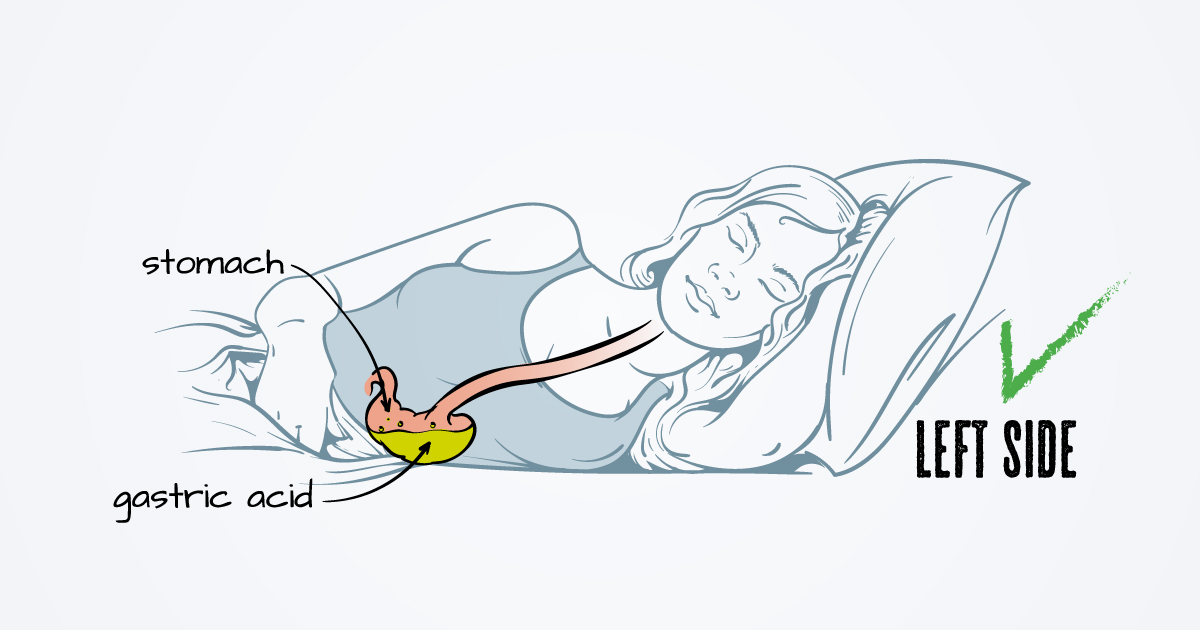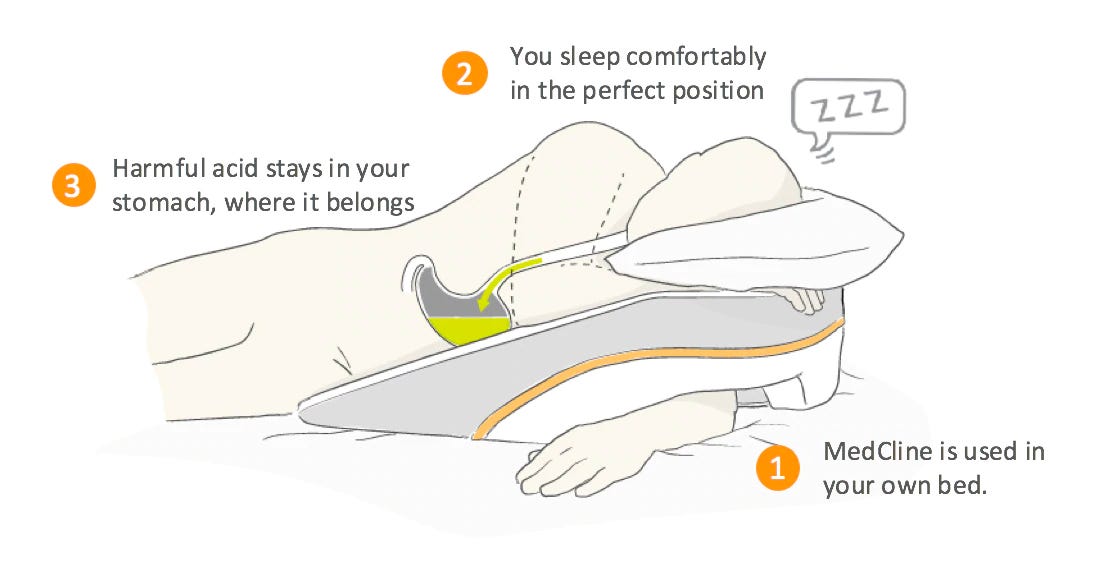Struggling to get a good night’s sleep because of GERD? You’re not alone.
The discomfort of acid reflux can turn your nights into endless battles with pillows and gravity. Imagine waking up refreshed, without the burning sensation disrupting your dreams. It’s possible, and this article is your roadmap to restful nights. We’ll share simple, effective strategies to ease your symptoms and help you reclaim your sleep.
Dive in to discover how you can enjoy peaceful nights and wake up ready to tackle the day with renewed energy and focus.

Credit: www.bangkokhospital.com
Understanding Gerd
Gastroesophageal Reflux Disease, or GERD, affects many people worldwide. It occurs when stomach acid frequently flows back into the esophagus. This acid reflux can irritate the lining of the esophagus. Understanding GERD is essential for managing its symptoms and improving sleep quality.
Symptoms And Causes
Common GERD symptoms include heartburn, chest pain, and a sour taste. These symptoms often worsen after eating or lying down. GERD’s causes range from obesity to certain medications. A weakened lower esophageal sphincter (LES) also contributes. This muscle normally keeps stomach acid from rising.
Impact On Sleep
GERD can disrupt sleep patterns significantly. Acid reflux often worsens at night, causing discomfort. Lying flat can exacerbate symptoms, making restful sleep difficult. Some people experience chronic coughing or choking sensations. These disturbances lead to fragmented sleep and daytime fatigue.
Creating A Sleep-friendly Environment
Creating a sleep-friendly environment is essential for those dealing with GERD. Elevate the head of the bed to reduce acid reflux. Choose comfortable bedding and avoid heavy meals before sleep to enhance restfulness.
Creating a sleep-friendly environment can significantly improve your nights with GERD. A calming and comfortable setting supports better rest. This approach helps reduce symptoms and promotes relaxation.
Choosing The Right Mattress
A supportive mattress makes a big difference for GERD sufferers. It provides comfort and reduces pressure on the stomach. A medium-firm mattress often works best. It balances support and comfort, helping to prevent reflux. Test different options to find what feels best for you.
Elevating Your Head
Raising your head can help reduce nighttime GERD symptoms. Elevating the upper body prevents stomach acid from rising. Use a wedge pillow or adjustable bed for elevation. Avoid stacking regular pillows, as they can cause neck strain. A slight incline is often sufficient for relief.
Dietary Adjustments
Living with GERD can disrupt your sleep. Dietary adjustments might help. Making changes to what and when you eat can ease symptoms. By choosing the right foods and timing your meals well, restful nights become more achievable.
Foods To Avoid
Certain foods can trigger GERD symptoms. Spicy dishes often cause heartburn. Fatty foods might relax the lower esophageal sphincter. This lets stomach acid flow back up. Chocolate and mint are also common culprits. They can increase acid reflux. Carbonated drinks can add pressure to the stomach. This can push acid into the esophagus. Caffeine and alcohol might worsen GERD symptoms too.
Timing Your Meals
The timing of meals plays a crucial role. Eating large meals close to bedtime can cause discomfort. It’s best to eat smaller portions. Try to finish meals 2-3 hours before lying down. This gives your stomach time to digest food. Eating slowly and chewing thoroughly can aid digestion. Avoid late-night snacks to prevent midnight reflux. A consistent meal schedule supports better digestion.

Credit: medcline.com
Lifestyle Changes
Living with GERD can significantly impact your quality of sleep. But making some lifestyle changes can help manage symptoms. Small adjustments in your daily routine can make a big difference. Let’s explore some effective lifestyle changes to improve sleep with GERD.
Managing Stress
Stress can worsen GERD symptoms. It can trigger acid reflux and disturb sleep. Consider simple stress-reducing activities. Deep breathing exercises can help calm the mind. Try meditation or yoga for relaxation. Even a few minutes a day can make a difference.
Engaging in a hobby can also lower stress. Reading, painting, or gardening can be effective. Find what works best for you. Prioritize stress management. Your sleep will benefit.
Incorporating Exercise
Regular exercise can aid digestion and reduce GERD symptoms. It helps maintain a healthy weight. This can lessen pressure on the stomach. Choose activities you enjoy. Walking, cycling, or swimming are great options.
Aim for at least 30 minutes most days. But avoid exercising right before bed. This can interfere with sleep. Instead, schedule workouts earlier in the day.
Remember, small changes can lead to big improvements. Adopt these lifestyle changes gradually. Your sleep and overall health will thank you.
Medications And Treatments
Managing Gastroesophageal Reflux Disease (GERD) often involves medications and treatments. These options help reduce symptoms and improve sleep quality. From over-the-counter solutions to prescribed medications, various treatments are available. Choosing the right option depends on your specific needs and doctor’s advice.
Over-the-counter Options
Over-the-counter (OTC) medications are a common choice for GERD relief. Antacids like Tums and Rolaids neutralize stomach acid. They offer quick relief for heartburn and indigestion. H2 blockers, such as famotidine, reduce acid production. They provide longer-lasting relief than antacids. Proton pump inhibitors (PPIs) like omeprazole are also available. They block acid production and heal the esophagus. OTC options are convenient but consult a doctor for long-term use.
Prescription Solutions
Prescription medications offer stronger relief for severe GERD cases. Doctors may prescribe higher doses of PPIs, such as pantoprazole. These medications reduce acid production significantly. Prokinetics help strengthen the lower esophageal sphincter. This action reduces reflux episodes and improves digestion. Sometimes, medications like baclofen reduce the frequency of reflux events. A healthcare professional will determine the best prescription based on symptoms. Always follow your doctor’s advice for safe and effective treatment.

Credit: cpapsupplies.com
Alternative Remedies
Many people with GERD find it hard to sleep. Traditional treatments help, but some look for alternative remedies. These alternatives can offer relief and improve sleep quality. Let’s explore some options.
Herbal Supplements
Herbal supplements are popular for managing GERD symptoms. Ginger is one such herb. It can reduce stomach acid and soothe inflammation. Chamomile is another choice. It helps calm the stomach and aids digestion. Licorice root is also known. It forms a protective layer on the stomach lining. Always consult a doctor before trying any supplements.
Relaxation Techniques
Stress worsens GERD symptoms. Relaxation techniques can help manage stress levels. Deep breathing exercises are simple and effective. They promote calmness and reduce anxiety. Meditation is another useful practice. It helps clear the mind and relax the body. Progressive muscle relaxation is also beneficial. It involves tensing and relaxing different muscle groups. These techniques support better sleep and reduce GERD discomfort.
When To Seek Professional Help
Persistent nighttime heartburn might indicate the need for professional help. Frequent GERD symptoms can disrupt sleep and daily life. Consult a doctor if discomfort persists despite lifestyle changes.
When struggling with GERD, knowing when to seek help is crucial. It’s important to identify signs that require professional attention. Ignoring these can lead to complications. Early intervention can prevent more serious issues.
Signs Of Complications
GERD can cause serious health problems over time. Persistent heartburn that doesn’t improve needs attention. If swallowing becomes difficult, it might indicate a problem. Frequent coughing or wheezing could be linked to GERD. Unexplained weight loss is another warning sign. These symptoms should not be ignored.
Consulting A Specialist
A gastroenterologist specializes in digestive health. They can provide a thorough examination. Tests may be needed to assess your condition. Specialists can suggest effective treatments. Medications might be adjusted for better relief. They offer tailored advice to manage GERD symptoms. Seeking their help can improve your quality of life.
Frequently Asked Questions
How Does Gerd Affect Sleep Quality?
GERD can cause discomfort, leading to poor sleep quality. Acid reflux may result in heartburn, coughing, or choking, disrupting sleep. Elevating the head during sleep and avoiding meals before bedtime can help. Managing GERD symptoms is crucial for maintaining healthy sleep patterns.
Can Sleeping Position Worsen Gerd Symptoms?
Yes, certain positions can exacerbate GERD symptoms. Sleeping flat may increase acid reflux. Elevating your head or sleeping on your left side can reduce discomfort. This position helps prevent stomach acid from flowing back into the esophagus, minimizing heartburn and improving sleep.
Is It Safe To Use Medication For Gerd At Night?
Using medication for GERD at night can be safe and effective. Antacids and proton pump inhibitors can provide relief from nighttime symptoms. Consult your doctor for personalized advice. They can recommend the best treatment plan based on your specific needs and health condition.
What Lifestyle Changes Help With Gerd At Night?
Lifestyle changes can significantly improve GERD symptoms at night. Avoid large meals before bedtime and maintain a healthy weight. Elevate the head of your bed and wear loose-fitting clothing. These adjustments can reduce acid reflux and improve sleep quality.
Conclusion
Finding relief from GERD at night improves overall well-being. Simple changes, like elevating your head or choosing the right foods, can make a difference. Consistency in these habits supports better sleep and reduces discomfort. Many people find success with lifestyle adjustments.
Small steps lead to restful nights. Explore what works best for you. Consult a healthcare provider for persistent symptoms. Restful sleep is vital for health. Prioritize it by managing GERD effectively. Sleep better, live better. Begin your journey to peaceful nights today.
